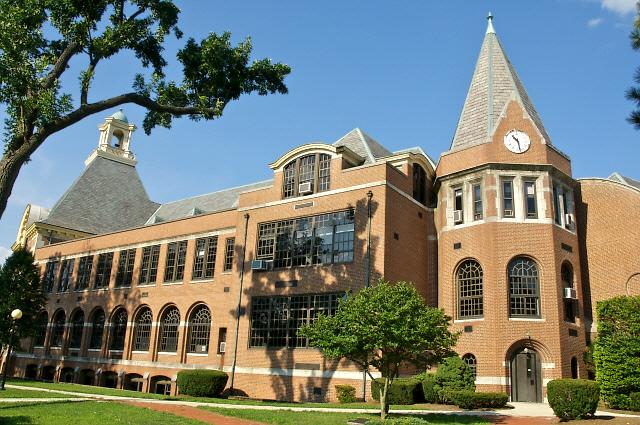The following appeared in the Wall Street Journal yesterday and it is one of the most concise and informative explanations I've seen for New Jersey's school funding mess -- and how we got here.
Click here to read it on its source site.
New Jersey's Suburban Tax Blues
By PAUL MULSHINE
Newark, N.J.
With Rush Limbaugh fawning over him on talk radio and Fred Barnes comparing him to Ronald Reagan, New Jersey Republican Gov. Chris Christie is being hailed a conservative hero. But conservatives here in the Garden State aren't sold. Mr. Christie has been in office just a few months and is kindling comparisons not to President Reagan, but to the last governor named Christie.
In 1993 Christie Whitman, like Chris Christie in 2009, won the Republican nomination for governor by tacking to the right in the primary. In the general election she promised to cut income taxes in every tax bracket and implement an initiative-and-referendum process to give voters direct input on public policies. Mr. Christie made the same promises last fall.
But here the comparison gets interesting. Ms. Whitman actually cut state income taxes across the board—before losing favor with conservatives thanks to her spending policies and judicial picks. But Mr. Christie hasn't mentioned cutting income taxes since election night. He's blasted runaway spending, for which he's received due credit. Yet his proposed state budget all but guarantees suburban homeowners a property-tax hike this year.
The most important political issue in New Jersey—the one that drives debates about income taxes, property taxes, and local government power—is public education. The core of the problem is a string of state Supreme Court decisions, the most sweeping of which were issued by judges Ms. Whitman put on the court.
These rulings have directed an ever larger share of state income taxes to a handful of urban school districts. Suburban homeowners pay income taxes to support the urban schools while also paying some of the highest property taxes in the country to support local schools.
Getting a better break for the suburbs has been Republicans' goal since the state income tax was instituted in 1976. And they were optimistic when Gov. Christie appointed Bret Schundler, a former Jersey City mayor and a strong supporter of school choice, as the state's commissioner of education. But Mr. Schundler shocked fellow Republicans by proposing a new education funding formula that tilts spending further in favor of cities.
In legislative hearings, Mr. Schundler said the formula had been fashioned to comply with past rulings of the state Supreme Court. The first such ruling came in 1976, when the court shut down the state's schools to demand that the state send more money to the cities. That crisis spurred then-Gov. Brendan Byrne, a Democrat, to push the legislature to create the state's income tax. He promised the money from the income tax would be used to cut property taxes statewide.
And it did—until 1985. That year the State Supreme Court, claiming that the constitution required the state to spend more money on schools in poorer communities, ordered New Jersey to pump large sums into what turned out to be 31 districts now known as the Abbott districts. Four years ago, the Abbott districts were receiving 56% of the income tax money that had been meant to relieve local property taxes, while the suburban districts got 44%. Under Mr. Christie's budget for next year, that 56% rises to 60%.
The Abbott districts get about $4.8 billion in aid, while the 500-plus other districts must split up $3.2 billion. Thus Asbury Park will receive $28,232 per-pupil from the state next year while Mendham, the governor's hometown, will get $2.32 per pupil.
The Christie formula zeroed out state aid to 59 towns, many of which gave him the largest pluralities in last year's elections. Many such towns send tens of millions in income taxes to Trenton, and also face endless property tax hikes to fund their own schools. West Orange resident Adam Kraemer, who spoke at an antitax rally in his North Jersey town recently, owns a four-bedroom home on a small lot and pays $25,972 a year in property taxes. Mr. Kraemer said he expects his tax bill to hit $27,600 under Mr. Christie's budget.
Mr. Christie has a habit of evading questions about what he would do for homeowners like Mr. Kraemer. So far, the governor has done little more than endorse a promise also made by Ms. Whitman: a proposal to create voucher programs. The governor argues that vouchers and charter schools would alleviate some of the financial pressure the Abbott districts place on the rest of the state. Fine, but in the meantime New Jersey homeowners are crying out for the sort of comprehensive reform Californians got under Proposition 13, the 1978 ballot measure that addressed a similar court takeover of school funding.
Mr. Christie's fortunes will rise and fall depending on whether he can take back control of school funding from the courts and give suburban towns an equal share of state aid. But if taxes continue to rise, his prospects will fall—no matter how much he pleases commentators who don't pay Jersey property taxes.
Mr. Mulshine is a columnist for the Newark Star Ledger.
Welcome!
Welcome to Laurie Goodman's blog. I use this space to share news and opinions about education and schools in Ridgewood, the state of New Jersey and the nation, in addition to other issues I'm personally interested in. I invite you to share your thoughts, feelings, questions or opinions, too, by posting comments on any blog entry. Please observe basic courtesy -- keep your comments focused on issues, no personal attacks or bullying, please. Contact me directly at: lauriegood@mac.com
Subscribe to:
Post Comments (Atom)





1 comment:
New Jersey Education Association president: 'Our governor is a liar'
http://blog.nj.com/njv_guest_blog/2010/05/new_jersey_education_associati.html
Post a Comment